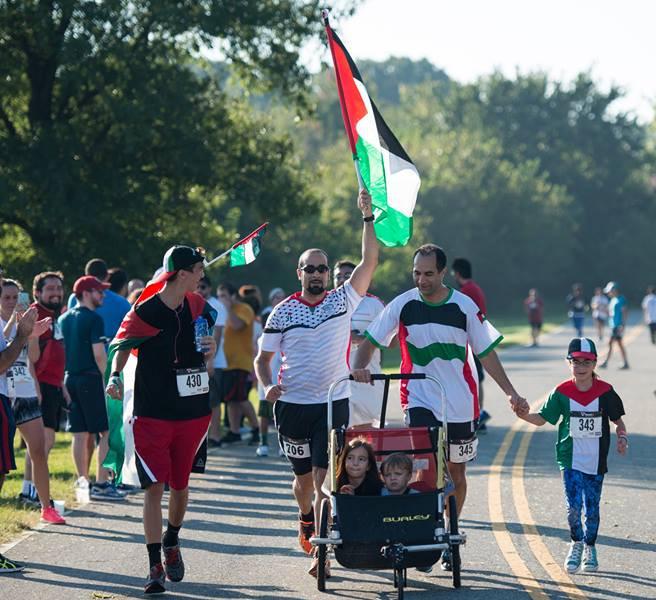Participants at the 7th Annual DC Gaza 5K this year sensed a stronger urgency to partake in the move for mental health, due to the decision from President Trump’s administration to cut all funding to UNRWA (United Nations Relief and Works Agency) on Aug. 31, 2018.
The race, which took place on the Anacostia Riverwalk Trail on Saturday, Sept. 22, began at 8:30 a.m. and attracted an estimated 700 people. Participants were young and old, many even walking with baby strollers while others ran to the finish line. After the race, participants gathered on the grass for the awards ceremony, where the winners of the race were recognized. This was followed by a debka party outdoors, in which participants held hands and joined in a large circle to learn the Arab folk dance which has long been a part of the Palestinian culture.
The Gaza 5K was created in 2012 to help fund UNRWA’s emergency assistance in the Gaza strip, including the Community Mental Health Programme (CMHP), which gives access to mental health care to Palestinian refugee children. Many of Gaza’s children are suffering from stress and other sorts of psychological trauma brought on by war and the blockade in Gaza. As a result, many endure anxiety, depression, poor concentration and sleep disorders. All funding from the Gaza 5K goes to support the Palestinian refugee children and helps provide a chance at a normal life.
Tabassum Siddiqui, 41, used to work as a school teacher and counselor and has learned about how trauma has long term affects. She participated in the DC Gaza 5K “to support the children and make sure they get the services they need.”
In addition to emergency assistance and mental health care services, UNRWA, through its fundraising, education and advocacy, is able to provide Palestinian refugees with free basic education, free healthcare and medicine, micro-finance, and relief and social services.
UNRWA was established by the United Nations General Assembly almost 70 years ago when hundreds of thousands of Palestinian refugees were displaced as a consequence of the creation of the state of Israel. It provides humanitarian aid to over 5 million Palestinian refugees in Jordan, Lebanon, Syria, the West Bank (including East Jerusalem) and the Gaza Strip.
Laila Elhaddad, 40, also participated in the race. She is originally from Gaza and her husband grew up in a Palestinian refugee camp in Lebanon. UNRWA provided Elhaddad’s husband with services while he lived in the refugee camp, and so this cause is near and dear to their heart. Elhaddad came to the race with her four children and her brother and his four children. Elhaddad says that participating in the race is “just one way to raise awareness about what’s happening in Gaza” and believes it’s especially critical at a time when the Trump administration has cut aid to UNRWA.
The director of communications at UNRWA, Laila Mokhiber, agrees that it’s a critical time for Palestinian refugees. In January of this year, the US government froze funding to UNRWA by $300 million (83% of its usual contribution), and cut off all aid completely as of Aug. 31st. According to Mokhiber, this is a political tactic to get “Palestinians to the negotiating table, which is not something that UNRWA engages in.” She believes that they are taking away critical resources from refugees, including UNRWA staff in Gaza and that this has nothing to do with the peace process.
Mokhiber hopes UNRWA can distribute half a million dollars to Gaza this year and emphasized the need for fundraising to make this happen. This year the Gaza 5K has three different locations: one in March 2018 in Brooklyn, NY, which raised $360,000, the recent DC Gaza 5K, which raised $175,000, and the last race, which will be held in Nov. 2018 in Houston Texas.
Alaa Hammouda, 28, a guest speaker at the DC Gaza 5K, works as a media officer for the Gaza Community Mental Health Program in Gaza. The counselors and staff at her organization train UNRWA’s employees in Gaza and understand the importance of the work they do. Hammouda was brought to the United States on a 3-month scholarship and considers herself as “one of the lucky ones” who got to leave and see the world.
Hammouda describes the situation in Gaza as challenging-living in occupation, having the Egyptian and Israeli border closed, and being accustomed to drinking polluted water. “Back in Gaza we have only four hours of electricity, if very lucky we get five,” she says. The anguish in her eyes was apparent as she spoke about her “children living in constant war and the continuous fear of bombs-the feeling of dying at any moment.”
Despite her living conditions in Gaza, Hammouda was moved by the solidarity she saw at the DC Gaza 5K and remains hopeful. Through her journey she aims to be the voice of the people of Gaza in the United States.
Maryan Abdelmesih, director of development at UNRWA, says there are many ways people can help UNRWA continue its good work despite the loss of funds from the US government. UNRWA is also doing their part to prevent future predicaments by working to diversify their funds, rather than relying heavily on one particular donor. Abdelmesih urges everyone to contact members of congress and adds “the more they hear from you the more they are inclined to take it seriously when discussing cuts.” Another way she says people can help is to educate others about who Palestinian refugees really are. To donate, visit unrwausa.org.










Comments powered by CComment